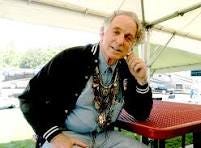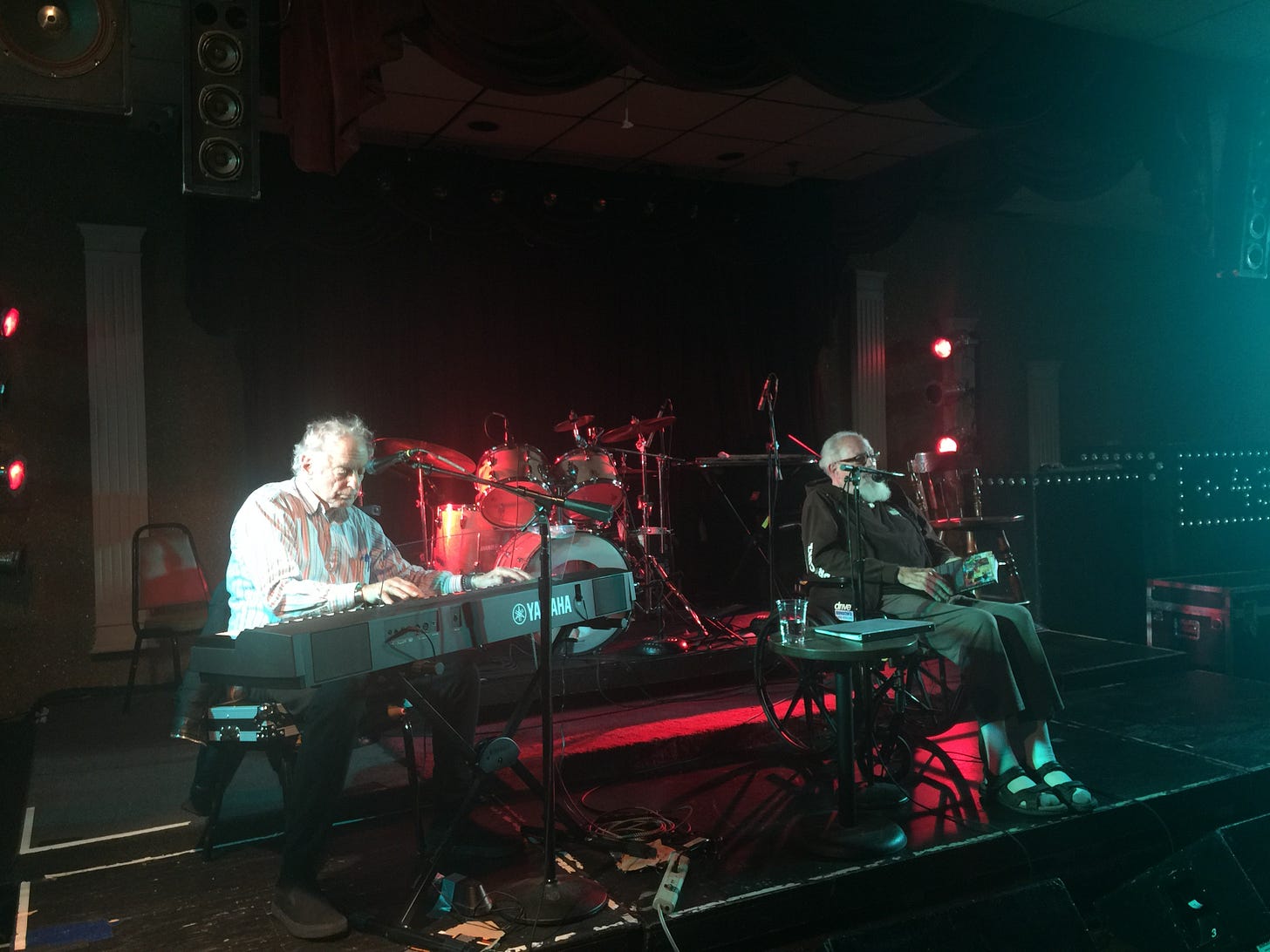JAZZ GREAT and Beat legend David Amram, the very embodiment of the crossover between the musical and the literary, has confirmed that a fourth instalment of his memoirs is on the way just months after a collection of celebratory essays on his life and work was issued by a prestigious publisher.
Rock and the Beat Generation was the first outlet to review The Many Worlds of David Amram: Renaissance Man of American Music when it emerged through Routledge last autumn, a volume that combined articles by men and women who knew him well but also sections in his own voice. But the 93-year-old is not leaving it there.
Amram has just confirmed that he has a further title planned, a new gathering of memoirs joining an earlier series of best-selling autobiographical accounts – Vibrations: The Adventures and Musical Times of David Amram (1968), Offbeat: Collaborating with Kerouac (2002) and Upbeat: Nine Lives of a Musical Cat from 2007.
A friend of and collaborator with Jack Kerouac in the middle 1950s – they appeared together in the first live jazz poetry event the novelist presented in New York City – he famously brought his wide musical skills into play on the soundtrack to the memorable Beat movie Pull My Daisy in 1959.
We interviewed Amram recently and he got R&BG up to speed on a number of topics, with the recent essay collection, the new memoir, his experiences as a young Jewish boy in the US and, of course, the Kerouac connection itself all part of the conversation…
Simon Warner: The Many Worlds of David Amram must have been an exciting project for you, with your friends, your peers, your collaborators, all contributing their thoughts on your achievement. How did it feel to hold this book of tributes in your hand? Did you learn anything new about yourself?
David Amram: It was awe-inspiring! The editor Dean Birkenkamp took a hodge-podge of seemingly unrelated topics and created a table of contents that made it become a real book! Suddenly, the seemingly crazy patchwork quilt of my life and all the adventures and relationships made sense and explained why I ended up being the classical composer I’d hoped to become, and how all the various activities described in the book influenced me to try to tell my story while still remaining a lifetime student at what I call the University of Hangoutology. And remembering to share my blessings with others as I turned 93!
SW: Your Jewish influence is touched upon quite often in The Many Worlds Of David Amram. There is a sense that a maudlin pessimism permeates the Jewish consciousness. Have you deliberately resisted that weight of cultural history in your upbeat approach to life and art?
Definitely. I learned as a child, when 8 years old in the second grade at a public school, as the only Jewish kid in the school, how much some people HATED Jews and was forced to fight every day and abused, spat upon and cursed at, by other CHILDREN.
This seemed crazy to me, since I didn’t understand why this was happening. I was aware of Hitler and his creation of the Holocaust because relatives of mine were still trapped in Europe and then disappeared. I was told by my father about the lucky three who escaped and managed to survive, but never knew about all the others who were murdered until much later.
It was only when we had a refugee youngster my age come to live with us at our farm, who told me what it was like to escape with hopes he would be reunited with his family, that the pain and shame of having to fight at every recess made me understand that this was something not unique to me..
My father told me that I had had to learn how to fight back in order to be left alone, as he had learned to do as a child. But he also made me realize that I had to understand the way things were going for most Americans during this huge and seemingly endless Great Depression, and that I must never succumb to despair, pity for myself or self -hatred. ‘Be proud of yourself and your heritage and always show respect for others,' he told me.
Plus, he read portions of the Old Testament that were beautiful and inspiring, and had me listen to the great cantors like Yussele Rosenblatt, and drew attention to the extraordinary talents of the Jewish contributions to medicine, science, literature, the theater, politics and sports, and to be PROUD, in a humble way, to honor all these people who remained true to their faith. And most important , to have RESPECT for every person who crossed my path.
And if they still hated Jews (even if they never even knew any) that was THEIR problem. And that every person in the USA has vestigial remains of self-loathing and that we ALL have to get over it!! Because racism is a mental disease that can be cured
He told over and over, my father, as did his brother, my Uncle David, to remember that other people also have problems and that life is precious!
Pictured above: David Amram on stage with the recently deceased John Sinclair at Lowell Celebrates Kerouac in October 2022. Image: Holly George-Warren
SW: A maddeningly difficult question, but if you had to choose one musical work – song or symphony – from your own repertoire to see out your days, what might it be? What do you most often return to?
DA: I think my favorite opera I wrote is Twelth Night.
My favorite cantata I wrote would be A Year in our Land.
My favorite chamber work is Thee Lost Loves.
My favorite orchestral work has to be This Land: Symphonic Variations on a Song by Woody Guthrie.
My favorite concerto is my Violin Concerto.
For my favorite wind orchestra piece, I would choose King Lear Variations.
I found it difficult even to choose ONE piece, because I am constantly reminded of Thelonious Monk’s classic response to the same question, which was…
‘Mr Monk. Since your appearance on the cover of Time magazine, as a genius of modern music, you have been compared by many critics as being An American Bach. What is your favorite composition?’
‘All of them,’ he responded.
‘Suppose you find one you don’t like?’
‘Then I don’t put it out,’ he said.
There the interview ended…
Since I don’t determine all recordings of my pieces, I do decide which ones I ask CF Peters to publish. They have been the publisher of all my concert music for the last 60 years. Of the 100 plus pieces I have composed for the concert stage, there is one I don’t think is up to par. It will not appear at my request!
SW: Can you remember the last time you saw Jack Kerouac?
DA: He was visiting New York and came by to crash at my place on Sixth Ave in 1967, two years before he passed away. He was broken-hearted that so many of his old friends had abandoned him because he fell out of fashion. We stayed in touch on the phone and by mail until a week before he died.
SW: The community of Beat originals is inevitably shrinking. Do you ever have contact with Gary Snyder?
DA: I hope to make a recording with Gary and the Chinese poet Wang Ping at the end of this year or in 2025. Gary is a very private person and I respect his lifetime of devotion to his ideals and his achievements as a unique artist. He has never wavered from the path he chose.
SW: Do you have a Beat text you particularly admire?
DA: Lonesome Traveler by Jack Kerouac. I set some of it to music in my cantata A Year in our Land and always insist I include excerpts in my readings with music in all of my jazz concerts. I re-read the whole book constantly. It is a perfect introduction to his unique style as a poetic novelist and storyteller who never stopped searching,
SW: I understand you are writing the fourth instalment of your memoirs. What is it called, what does it cover and when will it be out?
DA: Since I missed the deadline 14 years ago for my fourth book, David Amram: The First 80 Years, I am working on it now and it is called David Amram: Notes from a Promising Young Composer.
It will be geared towards what is happening NOW with the hopes that it will inspire a younger generation to think and act creatively and realize that we are all born artists until we are talked out of it. I’ll be sure to have them read the ‘Navajo Prayer of the 12th Night’ also called ‘The Trail of Beauty’.
I’ll also include some unpublished letters and the names of some brilliant young artists of all genres who inspire me to keep on keeping on!
SW: Thank you, David, for those generous and informative as answers and we look forward to the latest collection of stories from your past and present.
See also: ‘Book review #18: The Many Worlds of David Amram: Renaissance Man of American Music’, November 11th, 2023




